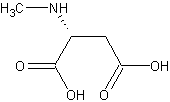Memantine for Adult ADHD
At the 57th Annual Meeting of the American Academy of Child and Adolescent Psychiatry (AACAP) in October 2010, Craig Surman of Massachusetts General Hospital reported results from an open study suggesting that the anti-Alzheimer’s drug memantine (Namenda) was effective in the treatment of ADHD in adults.
Editor’s Note: Gianni Faedda also indicated to this writer that he had successfully used memantine, an antagonist of the glutamate NMDA receptor, for children with ADHD. He observed that memantine was also helpful in several of his treatment-resistant bipolar patients. Based on these anecdotal observations, this compound deserves further systematic exploration. It is also noteworthy that Amit Anand and colleagues found that memantine increased antidepressant response to lamotrigine in bipolar depression compared to placebo.
Rare Encephalitis Affects NMDA Receptor
At the 57th Annual Meeting of the American Academy of Child and Adolescent Psychiatry (AACAP) in October 2010, Nadine Schwartz reported that in a rare type of encephalitis, antibodies specifically target and bind to N-methyl-D-aspartate (NMDA) receptors, the major receptors for excitatory neurotransmission in the brain. Individuals usually develop psychiatric symptoms before neurological ones, and were previously often thought to be malingering or inventing their illness. Eventually they may develop profound cognitive and motor deterioration and many may require treatment in an intensive care unit in order to provide adequate respiration. Studies show that children with this syndrome appear to respond to anti-immune therapeutic approaches including steroids, plasmaphoresis, and antimetabolites.
Editor’s Note: The recognition that auto-antibodies can attack the major receptors for excitatory neurotransmission in brain brings to light another potential mechanism that could explain neurochemical dysregulation in the neuropsychiatric disorders.
Thalamic Volume and Neural Connectivity in Autism
 Ish Bhalla reported at the 57th Annual Meeting of the American Academy of Child and Adolescent Psychiatry (AACAP) in October 2010 that children with autism have greater thalamic volume than normal controls. Other posters presented at the meeting showed that patients with autism spectrum disorders have connectivity abnormalities, with increased connectivity of neurons to other nearby neuronal groups and decreased connectivity of neurons to areas of the brain at a greater distance.
Ish Bhalla reported at the 57th Annual Meeting of the American Academy of Child and Adolescent Psychiatry (AACAP) in October 2010 that children with autism have greater thalamic volume than normal controls. Other posters presented at the meeting showed that patients with autism spectrum disorders have connectivity abnormalities, with increased connectivity of neurons to other nearby neuronal groups and decreased connectivity of neurons to areas of the brain at a greater distance.
Editor’s Note: These findings echo reports that the corpus callosum, the main structure connecting neurons across the two hemispheres of the brain, is smaller in autism. In addition, other investigators have reported abnormalities in cortical column structure in autism.
Interestingly, the findings of increased volume and altered connectivity may even be reflected in measurements of brain and head size. A substantial literature supports the observations that children with autism have greater initial head size and growth of their heads compared with the normal infant population.
Maternal Depression May Affect Child’s Brain
At the 57th Annual Meeting of the American Academy of Child and Adolescent Psychiatry (AACAP) in October 2010, Dana Serino of Columbia University reported that mothers who experienced depression while pregnant had children with increased size in both their left and right medial temporal gyri, parts of the brain that may be responsible for judging distance, recognizing faces, and understanding word meaning.
Editor’s Note: These data extend preclinical studies that have shown that a variety of prenatal stressors are capable of exerting substantial effects on biology and behavior in children. In addition to affecting medial temporal gyrus volume, prenatal depression has also been shown to have effects on behavior of newborns, indicating that depression during pregnancy may have adverse effects on both the mother and the newborn.
Screening Tool for Depression and Anxiety Available via iPhone
My Mood Monitor, a website for mental health screening, has introduced depressioncheck, a free, mobile version of their M-3 Checklist, a scientifically validated screening tool for mood and anxiety disorders that can now be used via Apple’s iPhone and iPod Touch. It can be found in the Itunes App Store.
Adapted from the online version, the mobile version provides a short series of questions that measure indicators of mental health. Developed by a team of mental health practitioners and experts, the checklist takes only three minutes to complete. It is ideal to fill out in the waiting room prior to an appointment with a general practitioner so the doctor can be made aware of potential problems in the area of mental health. Depressioncheck is appropriate for those 18 years and older and its accuracy was confirmed in an article published in the Annals of Family Medicine in March 2010.
We recommend My Mood Monitor and the new mobile application as simple and reliable screening tools that can assess the presence of unipolar and bipolar mood and anxiety disorders, including obsessive-compulsive disorder, panic disorder, and PTSD. Read more
Treatment Plans for Maladaptive Impulsive Aggression in Children
Maladaptive impulsive aggression often co-occurs with other psychiatric illnesses in children, so it can be difficult to find treatment solutions. A symposium at the 57th Annual Meeting of the American Academy of Child and Adolescent Psychiatry yielded some suggestions. Read on for an overview of impulsive aggression and possible treatment plans.
At the symposium, held in New York Oct. 26-31, 2010, panelists called maladaptive aggression the “fever” of child psychiatry (because it is common but also nonspecific) and described the phenomenon as “the language of the inarticulate.” The panelists drew a distinction between impulsive aggression, which describes behavior that is unplanned, unprofitable, and poorly controlled, and another phenomenon, predatory aggression, which describes behavior that is planned, sometimes profitable, and highly controlled.
The speakers on the panel indicated that impulsive aggression is related to other psychiatric syndromes including depression, attention deficit hyperactivity disorder (ADHD), mania, conduct disorder, oppositional defiant disorder, anxiety, post-traumatic stress disorder (PTSD), borderline personality disorder, autism, and schizophrenia. This raises problems for drug development, as Tom Laughren of the Federal Drug Administration (FDA) indicated in one talk at the symposium, because when new treatments are developed, they are studied in the context of only one primary disorder. Read more
Diet, Depression, Inflammation and the Brain
We’ve been posting recently about diet and about treatments that are weight-neutral. There is evidence that diet, inflammation and depression are all linked. Epidemiological studies by Joe Hiblen have shown that in countries whose populations eat more fish and thus have high levels of omega-3 fatty acids in their diet, there is lower incidence of depression, suicide, and cardiovascular disease such as heart attacks and strokes. This may be because the major omega-3 fatty acids, EPA and DHA, are anti-inflammatory, and inflammation has been linked to depression. EPA inhibits the enzymes phospholipase A2 and cyclo-oxygenase-2 (COX-2), and their subsequent inflammatory effects on cytokines. DHA inhibits the pro-inflammatory cytokine IL6.
Researcher John Davis recently reviewed relevant literature and found that diets high in anti-inflammatory omega-3 fatty acids are associated with lower incidence of depression, cardiovascular disease, and markers of inflammatory processes. Conversely, diets high in fat and in inflammatory omega-6 fatty acids are associated with obesity, depression, and cardiovascular disease.
Various studies have shown the links between inflammation and depression. For example, when patients are given alpha-interferon to treat viral hepatitis, there is a subsequent increase in inflammatory cytokines IL-1 and IL-6, and depression often follows. Also, depressed patients have an increased ratio of pro-inflammatory to anti-inflammatory cytokines in their blood.
Another sign of a link between bipolar illness and inflammation can be seen in biochemical analysis of brain specimens obtained at autopsy. Researcher Rapaka Rao in the laboratory of Stanley Rapoport at the National Institute on Aging at the National Institutes of Health in Bethesda, Maryland, has reported that increased markers of neuronal inflammation and excitotoxicity were found in the brains of people who had had bipolar disorder. Phospholipase A2 and COX-2 were significantly elevated in the brains of those with bipolar illness and those with schizophrenia compared with controls. Pro-inflammatory interleukin I was also significantly increased in the brains of those who had had either illness. Read more
The Evolving Omega-3 Fatty Acid Story: The Icing on the Cake (And Why It Shouldn’t Be Eaten)
 Omega-3 fatty acids are important for brain development and function and are essential to the human diet since they cannot be synthesized by the body. Omega-3 fatty acids are derived from canola oil, walnuts, flax seed oil, leafy vegetables, and especially fish. The main omega-3 fatty acids include eicosapentaenoic acid (EPA) and docosahexaenoic acid (DHA). They have anti-inflammatory effects, unlike omega-6 fatty acids, which are pro-inflammatory. The omega-6 fatty acids come from soy, peanuts, corn oil, and meats, and are associated with increases in obesity, myocardial infarction, and stroke.
Omega-3 fatty acids are important for brain development and function and are essential to the human diet since they cannot be synthesized by the body. Omega-3 fatty acids are derived from canola oil, walnuts, flax seed oil, leafy vegetables, and especially fish. The main omega-3 fatty acids include eicosapentaenoic acid (EPA) and docosahexaenoic acid (DHA). They have anti-inflammatory effects, unlike omega-6 fatty acids, which are pro-inflammatory. The omega-6 fatty acids come from soy, peanuts, corn oil, and meats, and are associated with increases in obesity, myocardial infarction, and stroke.
In a recent review of the literature, John Davis and Joe Hiblen found that diets that include high levels of omega-3 fatty acids are associated with decreased incidence of depression, suicide, and cardiovascular disease. The researchers performed a meta-analysis of all the prospective depression treatment studies of omega-3 fatty acids compared to placebo. They found that EPA had antidepressant effects in humans, with moderate effect size and a high degree of statistical significance. DHA, however, did not appear to have an antidepressant effect, and pure DHA was even associated with some worsening of depression.
Editor’s note: This meta-analysis helps clarify some of the ambiguities in the literature about the antidepressant efficacy of the omega-3 fatty acids, clarifying that EPA alone is an effective antidepressant. The one study that did not find antidepressant effects with EPA was carried out by the Bipolar Collaborative Network, in which I am an investigator. Our study, published in an article by Keck et al., showed that 6g of EPA was not significantly more effective than placebo in bipolar depression or in rapid cyclers. However, there is some indication that 6g may be too high a dose of EPA, and most of the recommendations now suggest using 1-2g of either EPA or an EPA/DHA combination. Read more






